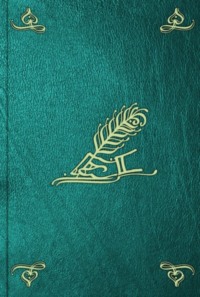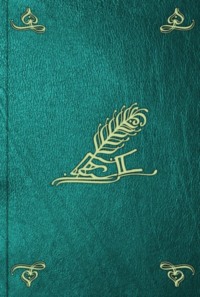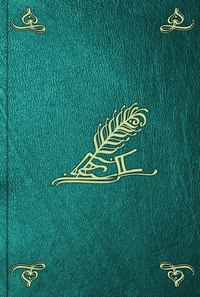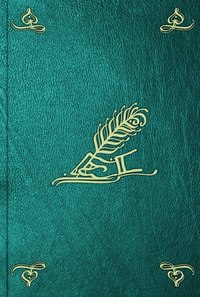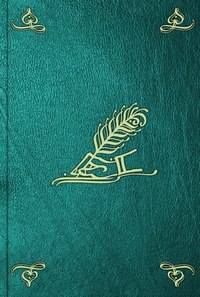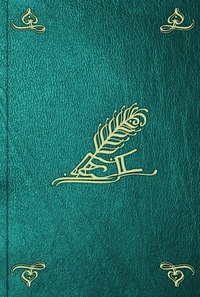 полная версия
полная версияCharles Darwin: His Life Told in an Autobiographical Chapter, and in a Selected Series of His Published Letters
173
Karl Ernst von Baer, b. 1792, d. at Dorpat 1876 – one of the most distinguished biologists of the century. He practically founded the modern science of embryology.
174
In the first edition of the Origin, Chap. IX. is on the 'Imperfection of the Geological Record;' Chap. X., on the 'Geological Succession of Organic Beings;' Chaps. XI. and XII., on 'Geographical Distribution;' Chap. XIII., on 'Mutual Affinities of Organic Beings; Morphology; Embryology; Rudimentary Organs.'
175
His brother.
176
Dr., afterwards Sir Henry, Holland.
177
Rev. Adam Sedgwick, Woodwardian Professor of Geology in the University of Cambridge. Born 1785, died 1873.
178
First edition, 1250 copies.
179
The passage was omitted in the second edition.
180
John Crawford, orientalist, ethnologist, &c., b. 1783, d. 1868. The review appeared in the Examiner, and, though hostile, is free from bigotry, as the following citation will show: "We cannot help saying that piety must be fastidious indeed that objects to a theory the tendency of which is to show that all organic beings, man included, are in a perpetual progress of amelioration and that is expounded in the reverential language which we have quoted."
181
A letter of Dec. 14, gives a good example of the manner in which some naturalists received and understood it. "Old J. E. Gray of the British Museum attacked me in fine style: 'You have just reproduced Lamarck's doctrine, and nothing else, and here Lyell and others have been attacking him for twenty years, and because you (with a sneer and laugh) say the very same thing, they are all coming round; it is the most ridiculous inconsistency, &c. &c.'"
182
See, however, p. 211.
183
Mr. Huxley has made a similar remark: – "Long occupation with the work has led the present writer to believe that the Origin of Species is one of the hardest of books to master." —Obituary Notice, Proc. R. Soc. No. 269, p. xvii.
184
This refers to the passage in the Origin of Species (2nd edit. p. 285) in which the lapse of time implied by the denudation of the Weald is discussed. The discussion closes with the sentence: "So that it is not improbable that a longer period than 300 million years has elapsed since the latter part of the Secondary period." This passage is omitted in the later editions of the Origin, against the advice of some of his friends, as appears from the pencil notes in my father's copy of the 2nd edition.
185
In the first edition, the passages occur on p. 488.
186
Gardeners' Chronicle, 1860. Sir J. D. Hooker took the line of complete impartiality, so as not to commit the editor, Lindley.
187
On Jan. 23 Gray wrote to Darwin: "It naturally happens that my review of your book does not exhibit anything like the full force of the impression the book has made upon me. Under the circumstances I suppose I do your theory more good here, by bespeaking for it a fair and favourable consideration, and by standing non-committed as to its full conclusions, than I should if I announced myself a convert; nor could I say the latter, with truth…
"What seems to me the weakest point in the book is the attempt to account for the formation of organs, the making of eyes, &c., by natural selection. Some of this reads quite Lamarckian."
188
In a letter to Mr. Murray, 1860, my father wrote: – "I am amused by Asa Gray's account of the excitement my book has made amongst naturalists in the U. States. Agassiz has denounced it in a newspaper, but yet in such terms that it is in fact a fine advertisement!" This seems to refer to a lecture given before the Mercantile Library Association.
189
Annals and Mag. of Nat. Hist. third series, vol. v. p. 132. My father has obviously taken the expression "pestilent" from the following passage (p. 138): "But who is this Nature, we have a right to ask, who has such tremendous power, and to whose efficiency such marvellous performances are ascribed? What are her image and attributes, when dragged from her wordy lurking-place? Is she ought but a pestilent abstraction, like dust cast in our eyes to obscure the workings of an Intelligent First Cause of all?" The reviewer pays a tribute to my father's candour "so manly and outspoken as almost to 'cover a multitude of sins.'" The parentheses (to which allusion is made above) are so frequent as to give a characteristic appearance to Mr. Wollaston's pages.
190
Another version of the words is given by Lyell, to whom they were spoken, viz. "the most illogical book ever written." —Life and Letters of Sir C. Lyell, vol. ii. p. 358.
191
"On the Zoological Geography of the Malay Archipelago." —Linn. Soc. Journ. 1860.
192
The late Sir Charles Bunbury, well known as a Paleo-botanist.
193
By Professor Henslow.
194
The translator of the first German edition of the Origin.
195
Spectator, March 24, 1860. There were favourable notices of the Origin by Huxley in the Westminster Review, and Carpenter in the Medico-Chir. Review, both in the April numbers.
196
François Jules Pictet, in the Archives des Science de la Bibliothèque Universelle, Mars 1860.
197
Edinburgh Review, April, 1860.
198
April 7, 1860.
199
My father wrote (Gardeners' Chronicle, April 21, 1860, p. 362): "I have been much interested by Mr. Patrick Matthew's communication in the number of your paper dated April 7th. I freely acknowledge that Mr. Matthew has anticipated by many years the explanation which I have offered of the origin of species, under the name of natural selection. I think that no one will feel surprised that neither I, nor apparently any other naturalist, had heard of Mr. Matthew's views, considering how briefly they are given, and that they appeared in the appendix to a work on Naval Timber and Arboriculture. I can do no more than offer my apologies to Mr. Matthew for my entire ignorance of his publication. If another edition of my work is called for, I will insert to the foregoing effect." In spite of my father's recognition of his claims, Mr. Matthew remained unsatisfied, and complained that an article in the Saturday Analyst and Leader, Nov. 24, 1860, was "scarcely fair in alluding to Mr. Darwin as the parent of the origin of species, seeing that I published the whole that Mr. Darwin attempts to prove, more than twenty-nine years ago." It was not until later that he learned that Matthew had also been forestalled. In October 1865, he wrote Sir J. D. Hooker: – "Talking of the Origin, a Yankee has called my attention to a paper attached to Dr. Wells' famous Essay on Dew, which was read in 1813 to the Royal Soc., but not [then] printed, in which he applies most distinctly the principle of Natural Selection to the races of Man. So poor old Patrick Matthew is not the first, and he cannot, or ought not, any longer to put on his title-pages, 'Discoverer of the principle of Natural Selection'!"
200
This refers to a "savage onslaught" on the Origin by Sedgwick at the Cambridge Philosophical Society. Henslow defended his old pupil, and maintained that "the subject was a legitimate one for investigation."
201
"The battle rages furiously in the United States. Gray says he was preparing a speech, which would take 1½ hours to deliver, and which he 'fondly hoped would be a stunner.' He is fighting splendidly, and there seem to have been many discussions with Agassiz and others at the meetings. Agassiz pities me much at being so deluded." – From a letter to Hooker, May 30th, 1860.
202
The statement as to authorship was made on the authority of Robert Chambers.
203
In a letter to Mr. Huxley my father wrote: – "Have you seen the last Saturday Review? I am very glad of the defence of you and of myself. I wish the reviewer had noticed Hooker. The reviewer, whoever he is, is a jolly good fellow, as this review and the last on me showed. He writes capitally, and understands well his subject. I wish he had slapped [the Edinburgh reviewer] a little bit harder."
204
Man's Place in Nature, by T. H. Huxley, 1863, p. 114.
205
See the Nat. Hist. Review, 1861.
206
It was well known that Bishop Wilberforce was going to speak.
207
Quarterly Review, July 1860.
208
Sir John Lubbock also insisted on the embryological evidence for evolution. – F. D.
209
Mr. Fawcett wrote (Macmillan's Magazine, 1860): – "The retort was so justly deserved and so inimitable in its manner, that no one who was present can ever forget the impression that it made."
210
This agrees with Professor Victor Carus's recollection.
211
See Professor Newton's interesting Early Days of Darwinism in Macmillan's Magazine, Feb. 1888, where the battle at Oxford is briefly described.
212
Quarterly Review, July 1860. The article in question was by Wilberforce, Bishop of Oxford, and was afterwards published in his Essays Contributed to the Quarterly Review, 1874. In the Life and Letters, ii. p. 182, Mr. Huxley has given some account of this article. I quote a few lines: – "Since Lord Brougham assailed Dr. Young, the world has seen no such specimen of the insolence of a shallow pretender to a Master in Science as this remarkable production, in which one of the most exact of observers, most cautious of reasoners, and most candid of expositors, of this or any other age, is held up to scorn as a 'flighty' person, who endeavours 'to prop up his utterly rotten fabric of guess and speculation,' and whose 'mode of dealing with nature' is reprobated as 'utterly dishonourable to Natural Science.'" The passage from the Anti-Jacobin, referred to in the letter, gives the history of the evolution of space from the "primæval point or punctum saliens of the universe," which is conceived to have moved "forward in a right line, ad infinitum, till it grew tired; after which the right line, which it had generated, would begin to put itself in motion in a lateral direction, describing an area of infinite extent. This area, as soon as it became conscious of its own existence, would begin to ascend or descend according as its specific gravity would determine it, forming an immense solid space filled with vacuum, and capable of containing the present universe."
The following (p. 263) may serve as an example of the passages in which the reviewer refers to Sir Charles Lyell: – "That Mr. Darwin should have wandered from this broad highway of nature's works into the jungle of fanciful assumption is no small evil. We trust that he is mistaken in believing that he may count Sir C. Lyell as one of his converts. We know, indeed, the strength of the temptations which he can bring to bear upon his geological brother… Yet no man has been more distinct and more logical in the denial of the transmutation of species than Sir C. Lyell, and that not in the infancy of his scientific life, but in its full vigour and maturity." The Bishop goes on to appeal to Lyell, in order that with his help "this flimsy speculation may be as completely put down as was what in spite of all denials we must venture to call its twin though less instructed brother, the Vestiges of Creation."
With reference to this article, Mr. Brodie Innes, my father's old friend and neighbour, writes: – "Most men would have been annoyed by an article written with the Bishop's accustomed vigour, a mixture of argument and ridicule. Mr. Darwin was writing on some parish matter, and put a postscript – 'If you have not seen the last Quarterly, do get it; the Bishop of Oxford has made such capital fun of me and my grandfather.' By a curious coincidence, when I received the letter, I was staying in the same house with the Bishop, and showed it to him. He said, 'I am very glad he takes it in that way, he is such a capital fellow.'"
213
April 10th, 1860. Dr. Gray criticised in detail "several of the positions taken at the preceding meeting by Mr. [J. A.] Lowell, Prof. Bowen and Prof. Agassiz." It was reprinted in the Athenæum, Aug. 4th, 1860.
214
On Sept. 26th, 1860, he wrote in the same sense to Gray: – "You never touch the subject without making it clearer. I look at it as even more extraordinary that you never say a word or use an epithet which does not express fully my meaning. Now Lyell, Hooker, and others, who perfectly understand my book, yet sometimes use expressions to which I demur."
215
The Historical Sketch had already appeared in the first German edition (1860) and the American edition. Bronn states in the German edition (footnote, p. 1) that it was his critique in the N. Jahrbuch für Mineralogie that suggested to my father the idea of such a sketch.
216
Hugh Falconer, born 1809, died 1865. Chiefly known as a palæontologist, although employed as a botanist during his whole career in India, where he was a medical officer in the H.E.I.C. Service.
217
In his letters to Gray there are also numerous references to the American war. I give a single passage. "I never knew the newspapers so profoundly interesting. North America does not do England justice; I have not seen or heard of a soul who is not with the North. Some few, and I am one of them, even wish to God, though at the loss of millions of lives, that the North would proclaim a crusade against slavery. In the long-run, a million horrid deaths would be amply repaid in the cause of humanity. What wonderful times we live in! Massachusetts seems to show noble enthusiasm. Great God! how I should like to see the greatest curse on earth – slavery – abolished!"
218
This refers to the remarkable fact that many introduced European weeds have spread over large parts of the United States.
219
Geologist, 1861, p. 132.
220
The letter is published in a lecture by Professor Hutton given before the Philosoph. Institute, Canterbury, N.Z., Sept 12th, 1887.
221
Mr. Bates is perhaps most widely known through his delightful The Naturalist on the Amazons. It was with regard to this book that my father wrote (April 1863) to the author: – "I have finished vol. i. My criticisms may be condensed into a single sentence, namely, that it is the best work of Natural History Travels ever published in England. Your style seems to me admirable. Nothing can be better than the discussion on the struggle for existence, and nothing better than the description of the Forest scenery. It is a grand book, and whether or not it sells quickly, it will last. You have spoken out boldly on Species; and boldness on the subject seems to get rarer and rarer. How beautifully illustrated it is."
222
Mr. Bates' paper, 'Contributions to an Insect Fauna of the Amazons Valley' (Linn. Soc. Trans. xxiii. 1862), in which the now familiar subject of mimicry was founded. My father wrote a short review of it in the Natural History Review, 1863, p. 219, parts of which occur almost verbatim in the later editions of the Origin of Species. A striking passage occurs in the review, showing the difficulties of the case from a creationist's point of view: —
"By what means, it may be asked, have so many butterflies of the Amazonian region acquired their deceptive dress? Most naturalists will answer that they were thus clothed from the hour of their creation – an answer which will generally be so far triumphant that it can be met only by long-drawn arguments; but it is made at the expense of putting an effectual bar to all further inquiry. In this particular case, moreover, the creationist will meet with special difficulties; for many of the mimicking forms of Leptalis can be shown by a graduated series to be merely varieties of one species; other mimickers are undoubtedly distinct species, or even distinct genera. So again, some of the mimicked forms can be shown to be merely varieties; but the greater number must be ranked as distinct species. Hence the creationist will have to admit that some of these forms have become imitators, by means of the laws of variation, whilst others he must look at as separately created under their present guise; he will further have to admit that some have been created in imitation of forms not themselves created as we now see them, but due to the laws of variation! Professor Agassiz, indeed, would think nothing of this difficulty; for he believes that not only each species and each variety, but that groups of individuals, though identically the same, when inhabiting distinct countries, have been all separately created in due proportional numbers to the wants of each land. Not many naturalists will be content thus to believe that varieties and individuals have been turned out all ready made, almost as a manufacturer turns out toys according to the temporary demand of the market."
223
Mr. Huxley was as usual active in guiding and stimulating the growing tendency to tolerate or accept the views set forth in the Origin of Species. He gave a series of lectures to working men at the School of Mines in November, 1862. These were printed in 1863 from the shorthand notes of Mr. May, as six little blue books, price 4d. each, under the title, Our Knowledge of the Causes of Organic Nature.
224
Kingsley's Life, vol. ii. p. 171.
225
In the Antiquity of Man, first edition, p. 480, Lyell criticised somewhat severely Owen's account of the difference between the Human and Simian brains. The number of the Athenæum here referred to (1863, p. 262) contains a reply by Professor Owen to Lyell's strictures. The surprise expressed by my father was at the revival of a controversy which every one believed to be closed. Professor Huxley (Medical Times, Oct. 25th, 1862, quoted in Man's Place in Nature, p. 117) spoke of the "two years during which this preposterous controversy has dragged its weary length." And this no doubt expressed a very general feeling.
226
The italics are not Lyell's.
227
The Antiquity of Man.
228
"Falconer, whom I [Lyell] referred to oftener than to any other author, says I have not done justice to the part he took in resuscitating the cave question, and says he shall come out with a separate paper to prove it. I offered to alter anything in the new edition, but this he declined." – C. Lyell to C. Darwin, March 11, 1863; Lyell's Life, vol ii. p. 364.
229
Man's Place in Nature, 1863.
230
This refers to a passage in which the reviewer of Dr. Carpenter's book speaks of "an operation of force," or "a concurrence of forces which have now no place in nature," as being, "a creative force, in fact, which Darwin could only express in Pentateuchal terms as the primordial form 'into which life was first breathed.'" The conception of expressing a creative force as a primordial form is the reviewer's.
231
Public Opinion, April 23, 1863, A lively account of a police case, in which the quarrels of scientific men are satirised. Mr. John Bull gives evidence that —
"The whole neighbourhood was unsettled by their disputes; Huxley quarrelled with Owen, Owen with Darwin, Lyell with Owen, Falconer and Prestwich with Lyell, and Gray the menagerie man with everybody. He had pleasure, however, in stating that Darwin was the quietest of the set. They were always picking bones with each other and fighting over their gains. If either of the gravel sifters or stone breakers found anything, he was obliged to conceal it immediately, or one of the old bone collectors would be sure to appropriate it first and deny the theft afterwards, and the consequent wrangling and disputes were as endless as they were wearisome.
"Lord Mayor. – Probably the clergyman of the parish might exert some influence over them?
"The gentleman smiled, shook his head, and stated that he regretted to say that no class of men paid so little attention to the opinions of the clergy as that to which these unhappy men belonged."
232
No doubt Haeckel, whose monograph on the Radiolaria was published in 1862.
233
The Marquis de Saporta.
234
Examen du livre de M. Darwin sur l'origine des espèces. Par P. Flourens. 8vo. Paris, 1864.
235
Lay Sermons, p. 328.
236
Charles Darwin und sein Verhältniss zu Deutschland, 1885.
237
An article in the Encyclopædia Britannica, 9th edit., reprinted in Science and Culture, 1881, p. 298.
238
In October, 1867, he wrote to Mr. Wallace: – "Mr. Warrington has lately read an excellent and spirited abstract of the Origin before the Victoria Institute, and as this is a most orthodox body, he has gained the name of the Devil's Advocate. The discussion which followed during three consecutive meetings is very rich from the nonsense talked."
239
Die natürliche Schöpfungs-Geschichte, 1868. It was translated and published in 1876, under the title, The History of Creation.
240
Zoological Record. The volume for 1868, published December, 1869.
241
Mr. Jenner Weir's observations published in the Transactions of the Entomological Society (1869 and 1870) give strong support to the theory in question.
242
Contemporary Review, 1871.
243
In the introduction to the Descent of Man the author wrote: – "This last naturalist [Haeckel] … has recently … published his Natürliche Schöpfungs-Geschichte, in which he fully discusses the genealogy of man. If this work had appeared before my essay had been written, I should probably never have completed it. Almost all the conclusions at which I have arrived, I find confirmed by this naturalist, whose knowledge on many points is much fuller than mine."
244
April 7 and 8, 1871.
245
His holiday this year was at Caerdeon, on the north shore of the beautiful Barmouth estuary, and pleasantly placed in being close to wild hill country behind, as well as to the picturesque wooded "hummocks," between the steeper hills and the river. My father was ill and somewhat depressed throughout this visit, and I think felt imprisoned and saddened by his inability to reach the hills over which he had once wandered for days together.



